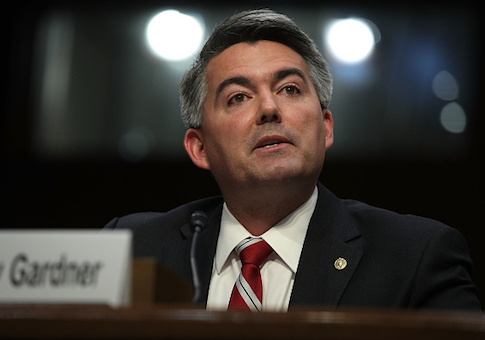The United States may need a cyber committee to oversee the prevention of state sponsored cyber attacks from countries such as China, North Korea, or Russia, according to Senator Cory Gardner (R., Colo.).
The senator raised this suggestion at a Senate Foreign Relations Committee hearing Tuesday on state-sponsored cyber attacks.
"One of things that I have supported and others on the committee have supported is the creation of a select committee on cyber security that would take the ranking member of the chair of each committee that has jurisdiction over cyber security, and put them on one committee, so that they can have a whole of government view, because this is a complex issue," Gardner said.
Since the WannaCry ransomware attack last month, the United States and other countries have become increasingly concerned with the possibility of military strikes coming in the form of organized cyber attacks on the nation’s economy or infrastructure.
Senior adviser for the Foundation for Defense of Democracies Samantha Ravich told the committee that countries such as China and North Korea have an asymmetrical advantage over the United States because they do not possess the same technological capabilities, making it easier for them to strike without fearing reciprocation. According to Ravich, the places most at risk are private American websites, as the government has done nothing to protect them from foreign threats.
"The business of America is at risk of being hollowed out from the inside by everything from the theft of intellectual property to the malicious infection of the supply chain to the degradation of confidence in our commerce, banking, and transportation sectors," she said.
Co-director of the Belfer Center for Science and International Affairs at Harvard University Eric Rosenbach elaborated on Ravich’s point, saying that one of the United States’ greatest strengths—its commitment to open information sharing—makes it susceptible to attacks from counties ruled by malicious authoritarian regimes.
"Unfortunately, no nation—including the United States—has responded to Russia’s recent cyber attacks in way that is visible and forceful enough to deter future attacks," he said, in reference to the still-unverified accusations that Russia interfered with U.S. presidential elections.
In response to questions from Senator Tim Kaine (D., Va.) about Russian cyber interference in the election, however, Rosenbach said this is more of a national security issue with higher priority than election results.
"This is not a political thing—I know there’s a lot going that’s associated with the political right now—but we as a country need to raise above the political fear about it and do something about cyber information attacks against the democracy, or otherwise in the years to come, it is just going to get worse," he said.
